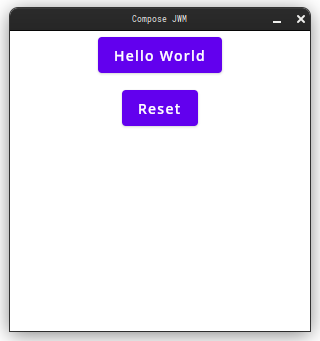This repo contains a simple Compose Desktop "Hello World" example program that can be compiled with GraalVM and native-image. It also contains glue code by github user @smallshen to make Compose work with JWM window library instead of AWT (It currently isn't possible to compile vanilla Compose AWT apps to native images). Tested on Windows, macOS(M1 and Intel) and Linux x64. Cross-platform compilation currently isn't possible, you need to run the compiler on the platform you're building for.
I've tested this example with Liberica Native Image Kit which is a distribution of GraalVM 22.3, Download and install here:
https://bell-sw.com/pages/downloads/native-image-kit/
(In my tests compilation currently fails on the latest official distribution of GraalVM)
Using SDKman(https://sdkman.io/), Liberica graalvm 22.3 can be installed using the command:
sdk install java 22.3.r17-nik
See also: https://www.graalvm.org/22.3/reference-manual/native-image/ for more info if needed.
Install Xcode command line tools:
xcode-select --install
Install Visual Studio and Microsoft Visual C++ (MSVC). There are two installation options:
- Install the Visual Studio Build Tools with the Windows SDK
- Install Visual Studio with the Windows SDK
You can use Visual Studio 2017 version 15.9 or later.
The gradle build will only work when run in x64 Native Tools Command Prompt. A shortcut to the X64 native tools terminal will be installed on your system together with Visual Studio Build Tools.
Install the dependencies using the command:
sudo apt-get install build-essential libz-dev zlib1g-dev
First make sure that the environment variable
JAVA_HOME is set to your GraalVM installation directory
also, and set GRAALVM_HOME to the same path. For example on Linux and Mac set:
export GRAALVM_HOME=$JAVA_HOME
on Windows set JAVA_HOME and GRAALVM_HOME in the Advanced System Properties GUI
or in the X64 native terminal:
setx /m GRAALVM_HOME %JAVA_HOME%
The nativeCompile task is provided by the
org.graalvm.buildtools.native gradle plugin:
To build use e.g:
./gradlew nativeCompile
or
gradlew.bat nativeCompile (on Windows X64 Native Tools terminal)
(This takes about 1 minute even on a fast machine!).
Find the compiler output in
build/native/nativeCompile/ directory!
Now hopefully you can try your AOT-compiled Compose app :)
(default binary name is composegraal)
The required json files generated in this step have already been included in this repository
under src/main/resources/META-INF/native-image
The GraalVM compiler cannot always statically predict usage of of Java Native Interface (JNI), Java Reflection, Dynamic Proxy objects. It also cannot predict which resources will be opened by your program. If you use JNI or Native libraries, reflection or depend on any code which does you will most likely encounter a build error when invoking GraalVM, or a runtime error.
In order to use these features we must provide native-image
with configuration meta data that tells the compiler which dynamic features will be used.
We also tell the compiler what resources will be required by the program, so that they can be included
in the output image.
The configuration is contained in the files
jni-config.json, reflect-config.json, resource-config.json,
predefined-classes-config.json and proxy-config.json
To automate the generation of these configuration files run:
./gradlew -Pagent run
The program will be run on the JVM together with the GraalVM tracing agent, upon exit the
tracing agent configuration files will be output to
build/native/agent-output/run/.
To copy or merge the configuration files with the existing ones under src/main/resources use the gradle task:
./gradlew metaDataCopy
The files will be copied and merged with any existing files in
src/main/resources/META-INF/native-image
Now you can run nativeCompile to invoke GraalVM with the new
configuration meta data!
See official GraalVM docs https://www.graalvm.org/latest/docs/
How to configure the graalvm Gradle plugin: https://graalvm.github.io/native-build-tools/latest/gradle-plugin.html
Jetpack Compose, JetBrains & GraalVM Team.
JWM by Nikita Prokopov @tonsky:
https://github.com/HumbleUI/JWM
JWM-Compose by @smallshen,
it is included in this repository under directory:
src/club/eridani/compose/jwm
